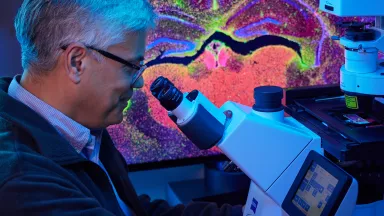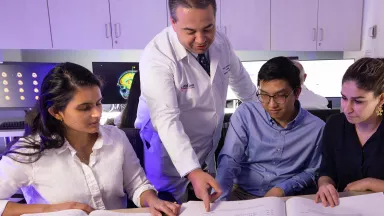Leading-Edge Autism & Communication Disorder Research
The Montefiore Einstein Center for Autism and Communications Disorders’ extensive research partnerships and initiatives have established Montefiore Einstein as leading stewards of the latest diagnostic, psychological and neuropsychological evaluations and treatments for people ages 5+ who face autism spectrum disorders and other developmental disabilities.

Current Projects
The Center for Autism and Communications Disorders hosts multiple initiatives to help patients, families, and caregivers navigate the challenges of living with or caring for someone with a developmental disorder. Our programs include the following:
CAAPABLE
A core component of CAAPABLE is the Prosody Project, which aids the development of stress and intonation in speech as well as non-verbal communication such as the use of the eyes and gestures. Impaired prosody is one of the most significant obstacles to social and professional integration.
The Prosody Project
The Prosody Project develops vocal timbre and, both, verbal (melody, volume, rhythm and fluency of speech) and nonverbal prosody (use of eyes, gesture) in adolescents and adults with ASD. Unfortunately, impaired prosody can play a powerful role in forming a negative first impression. As a result, the gifts and potential contributions of individuals with prosody deficits often go unrealized. Impaired prosody is, in fact one of the most significant obstacles to “social integration and vocational acceptance”.
Dunn, M. A. & Harris, L. E. (in press). The Music of Speech: Prosody Intervention for High-functioning Adolescents with Autism Spectrum Disorders. London: Jessica Kingsley Publishers.
Sensory Integration Therapy in Autism: Mechanisms and Effectiveness
A common feature of ASD is over or under sensitivity to the environment and difficulty putting sensory information together in an orderly way, referred to here as sensory issues. Building on previous work, this study will test the efficacy of Sensory Integration Therapy (SIT), a non-invasive intervention to improve functional skills in children with ASD, in comparison to commonly applied ABA behavioral treatments, in the treatment of ASD symptoms.
A 12-week Placebo-Controlled Study to Investigate the Efficacy, Safety and Tolerability of RO7017773 in Participants Aged 15 - 45 years with Autism Spectrum Disorder (ASD)
This study will investigate the efficacy, safety, tolerability, and pharmacokinetics of RO7017773 in participants aged 15-45 years who have been diagnosed with ASD with a score of >/=50 on the Wechsler Abbreviated Scale of Intelligence (WASI-II).
Voxelator Neurocognitive Function Study
This is a Phase 3b, randomized, double-blind, placebo-controlled, multicenter study to assess the treatment effect of voxelotor on neurocognitive function as assessed by the National Institute of Health (NIH) Toolbox Cognition Module of executive abilities in pediatric participants (8 to < 18 years) with SCD.
An Open-Label Study of CM-AT for the Treatment of Children with Autism
This is a Phase III, open label extension study evaluating the continued safety and efficacy of CM-AT in pediatric patients with autism with all levels of fecal chymotrypsin.
Our Collaborators
Our program actively collaborates with the Montefiore Einstein Institute for Clinical and Translational Research (ICTR) and other clinical investigators at Montefiore Einstein. We have received funding from the following organizations:
Cannabidivarin (CBDV) vs. Placebo in Children with Autism Spectrum Disorder (ASD)
This study aims to examine the efficacy and safety of cannabidivarin (CBDV) with the primary aim of studying its effect on irritability in children with ASD.
Study Design
This is a 12-week randomized, double-blind study of CBDV vs. placebo in one hundred children and adolescents subjects aged 5 to 18 years with a diagnosis of ASD.
aV1ation: A Study to Investigate the Efficacy and Safety of Balovaptan in Participants with Autism Spectrum Disorder (ASD)
Balovaptan is a drug that blocks a hormone receptor (vasopressin 1a) in the brain that is linked to socialization, stress, anxiety, and aggression. Balovaptan has the potential to be the first pharmacotherapy to help improve core socialization and communication symptoms of ASD, and it has been granted Breakthrough Therapy Designation by the FDA.
Study Design
This is a multi-center, randomized, double-blind, 24-week study to investigate the efficacy, safety, and pharmacokinetics of Balovaptan in children and adolescents aged 5-17 years with ASD who are high functioning (IQ >=70). After the participant completes the 24-week double-blind phase of the study, he/she will have the option to receive Balovaptan in open treatment for 52 weeks.
oRBiting: A Study to Evaluate Scales for Repetitive and Restricted Behaviors in Children, Adolescents, and Adults with Autism Spectrum Disorder (ASD)
This study is observational and seeks to characterize different scales to measure repetitive and restricted behaviors in different ASD subpopulations over time. The study will also explore the use of digital biomarkers. The results from this study will inform the planning and setup of subsequent drug interventional studies in programs aimed to treat restrictive and repetitive behaviors in ASD.
Intranasal Oxytocin vs. Placebo in Children with Prader-Willi Syndrome (PWS)
The primary goal of this study is to examine the safety and efficacy of IN-OXT on hyperphagia, as measured by the Hyperphagia Questionnaire-Clinical Trials.
Study Design
This is an 8-week double-blind, randomized study in 50 children with PWS aged 5-17. Participation involves 5 in-person visits to our program and two telephone-call visits.






